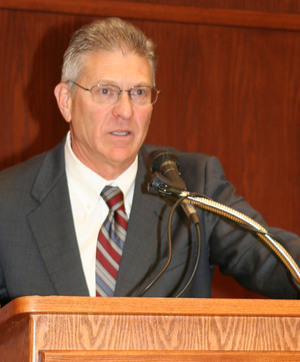Supreme court justice says changes being made in Nebraska courts

Technological changes are being made in the Nebraska court system “to bring it into the 21st century”, the chief justice of the Nebraska Supreme Court told an audience made up mostly of students at Chadron State College on Thursday.
Speaking at the final program in the college’s Justice Studies Series at this fall, Mike Heavican said more electronic media coverage will be allowed and new technology will be utilized in courts across Nebraska in the near future. He said the moves will help inform the public on how the judicial system works, increase the efficiency of the courts and make the trials more interesting to juries.
Heavican said the judiciary is often the forgotten branch of government because it is less flamboyant than the other branches and judges and supreme court justices don’t campaign for election or re-election. But he added that the judiciary branch is extremely important because it provides justice and brings stability to government.
“We have a great story to tell, and believe some of the changes will make the public more aware of it,” he said.
Heavican, who became chief justice a year ago after serving five years as head of the U.S. attorney’s office in Nebraska, said most of the surrounding states already allow radio microphones and television cameras in the court rooms. Colorado has permitted radio stations to air court proceedings for 50 years and Iowa has allowed electronic media coverage in its courts for 25 years, he said.
By early 2009, Heavican said he hopes oral arguments in the supreme court and appellate courts will be available on webcasts that could be shown at the University of Nebraska Law School, colleges and high schools. He said he also wants to allow television coverage of trials across the state.
The chief justice said a vast change is taking place in court reporting and record-keeping. With a system called “e-filing,” he said court documents will be available electronically and reduce the stacks of papers, court filings and briefs that attorneys and judges now use.
“It will be of great advantage to those who practice law and will save paper and storage space,” Heavican said. “Attorneys will be able to retrieve documents 24 hours a day (on their computers) if they so desire. We want to get Nebraska on board with this system as soon as possible. It will cost money, and we’re going to have to talk to the governor and the legislature about that.”
He said another system will allow police reports, contracts and other papers used for evidence to be shown electronically to juries.
Heavican also said the state is making a great effort to expedite the handling of cases involving children. He said Nebraska has an inordinate number of children who have been removed from their homes, become wards of the state and are placed in foster care. He said the state wants to speed the process so the children can be permanently placed as soon as possible.
“We don’t want the court system to delay the process,” he said. “We want the pre-hearing conference to take place as soon as possible after the child is removed from the home and get them back in the home as soon as we can with the proper services provided. There is nothing more important than how we treat children, and we don’t want the courts to be responsible for any problems that may result.”
He also said he wants to make sure the children are present at all court hearings, that there is cooperation between the courts and that judges stick to federal guidelines. He noted that the federal government is pushing for progress in these areas because it provides much of the funding for health and human services that are administered.
Heavican fielded several questions at the end of his talk. He told one individual that because of his position he could not comment on whether John Bruning, the Nebraska attorney general, may have violated state statues when he made comments contained in a Panhandle newspaper concerning the action by law enforcement officers following the Oct. 3 death of teen-ager Jessie Britton in Crawford and prior to the recent grand jury hearing.
In response to another question, Heavican said child abuse, business compensation and criminal cases get priority over civil cases in the supreme court, but he is concerned about court progression throughout the system.
Category: Campus News
